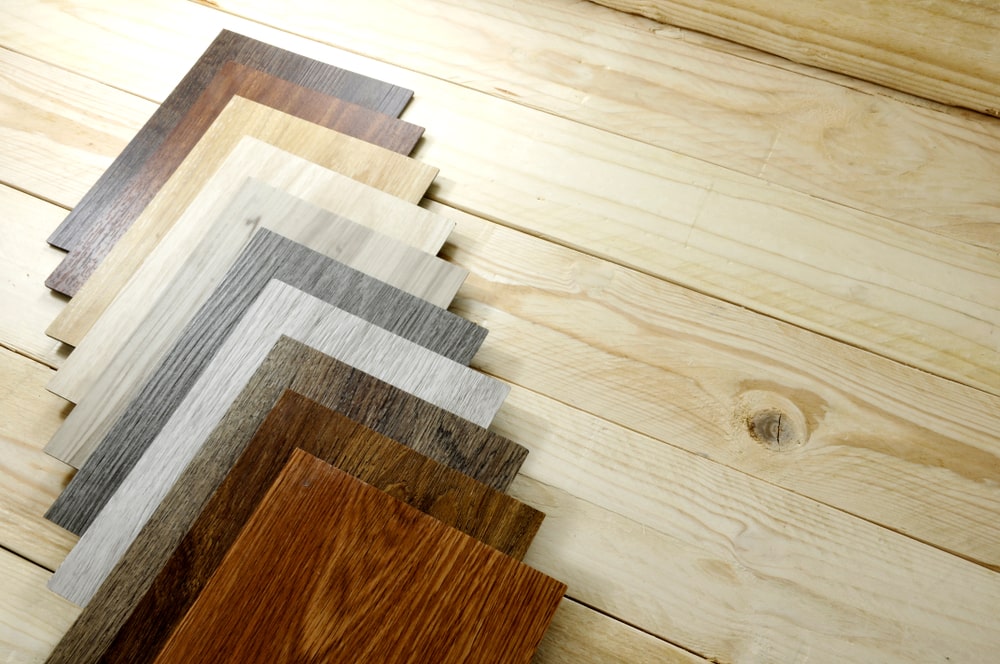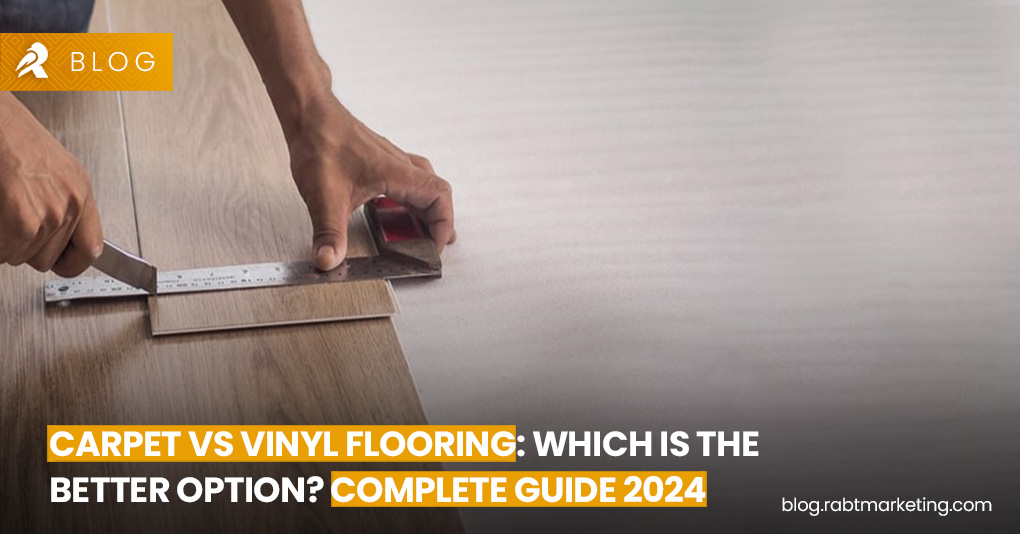Choosing the right flooring for your home or office space is a significant decision, as it can impact the aesthetics, comfort, durability, and even the value of your property. Regarding flooring options, carpet and vinyl are two popular choices. Each has its advantages and considerations, making the decision-making process challenging for many homeowners. In this article, we will compare carpet and vinyl flooring to help you determine which option fits your needs better.
Comparison of Different Properties of Carpet Vs Vinyl Flooring

Durability
Durability is a notable factor to consider when selecting flooring materials, especially in high-traffic areas. Carpet, typically made from nylon, polyester, or wool fibers, offers a soft and comfortable surface but may be prone to staining, wear, and tear over time. On the other hand, vinyl flooring, known for its resilience and water resistance, tends to be more durable and resistant to scratches and dents, making it an excellent choice for areas prone to spills or heavy foot traffic.
Maintenance
Maintenance requirements vary between carpet and vinyl flooring. The carpet requires regular vacuuming and occasional steam cleaning to keep it clean and free of dust, dirt, and allergens. Stains on carpets may also require immediate attention to prevent them from setting in permanently. In contrast, vinyl flooring is relatively low-maintenance, requiring only regular sweeping and occasional mopping to maintain its appearance. Additionally, vinyl is more resistant to stains and moisture, making it easier to clean and maintain in the long run.
Cost
Cost is often a significant consideration for homeowners when choosing flooring materials. The cost of carpet and vinyl flooring can vary depending on factors such as quality, style, and installation method. Generally, carpet tends to be more budget-friendly upfront, with a wide range of options available at different price points. However, it’s essential to consider the long-term costs, including maintenance and replacement, when comparing the overall cost of carpet and vinyl flooring.
Installation Process
The installation process for carpet and vinyl flooring differs significantly. Carpet installation typically involves stretching the carpet over padding and securing it to the subfloor with tack strips or adhesive. In contrast, vinyl flooring can be installed using various methods, including peel-and-stick tiles, click-lock planks, or full-spread adhesive. The installation process for vinyl flooring is generally quicker and less labor-intensive than carpet, making it a more convenient option for many homeowners.
Aesthetics
Aesthetics is a highly important factor in the decision-making process regarding flooring options. Carpet offers various colors, patterns, and textures, allowing homeowners to customize their space to suit their personal style and preferences. On the other hand, vinyl flooring also comes in various styles, including wood, stone, and tile designs, offering versatility and flexibility in design options. Ultimately, the choice between carpet and vinyl flooring depends on the desired look and feel of the space.
Comfort
Comfort is another essential factor when selecting flooring materials, particularly in residential settings. Carpet provides a soft and plush surface that offers warmth and insulation, making walking and standing on comfortable, especially in colder climates. In contrast, while durable and resilient, vinyl flooring may feel colder and harder underfoot, particularly in areas with minimal insulation. However, area rugs or underlayments can be added to enhance the comfort of vinyl flooring.
Environmental Impact
The environmental impact of flooring materials is becoming increasingly important for eco-conscious consumers. Carpet, particularly those made from synthetic fibers, may contain chemicals and adhesives that can off-gas volatile organic compounds (VOCs) into the indoor air, contributing to indoor air pollution. Additionally, carpet production and disposal can have negative environmental impacts, including resource depletion and landfill waste.
Vinyl flooring, while also made from synthetic materials, may be more environmentally friendly if it contains recycled content and is recyclable at the end of its life cycle.
Health Concerns
Health concerns are significant, particularly for individuals with allergies, asthma, or other respiratory issues. Carpet fibers can trap dust, dirt, pet dander, and allergens, potentially exacerbating indoor air quality issues and respiratory symptoms. Regular vacuuming and cleaning can help mitigate these concerns, but some individuals may still prefer hard surface flooring options like vinyl. Vinyl flooring, while resistant to allergens and moisture, may emit VOCs from adhesives and manufacturing processes, posing potential health risks.
Lifespan
The lifespan of flooring materials varies depending on factors such as quality, maintenance, and wear and tear. Carpet typically has a shorter lifespan than vinyl flooring, lasting around 10-15 years on average with proper care and maintenance. In contrast, vinyl flooring can last over 20 years or more, making it a long-term investment for homeowners.
Versatility
Versatility is another consideration when choosing between carpet and vinyl flooring. Carpet is well-suited for bedrooms, living rooms, and other areas where comfort and warmth are desired. However, it may not be suitable for moisture-prone areas, such as kitchens, bathrooms, and basements.
Vinyl flooring, with its water-resistant properties and durability, is suitable for virtually any room in the home, including high-moisture areas like kitchens and bathrooms.
Resale Value
The choice of flooring can also impact the resale value of a property. While carpet may offer comfort and warmth, it may not appeal to all potential buyers, particularly those with allergies or preferences for hard surface flooring.
Vinyl flooring, with its durability, low maintenance, and wide range of design options, may attract more buyers and enhance the property’s overall value.
Installation Location
When choosing between carpet and vinyl flooring, it’s essential to consider the installation location and specific requirements such as moisture resistance, traffic patterns, and design preferences. For areas prone to spills and moisture, such as kitchens, bathrooms, and basements, vinyl flooring is often the preferred choice due to its water resistance and easy cleanup. In contrast, carpet may be more suitable for bedrooms, living rooms, and other low-traffic areas where comfort and insulation are priorities.
Maintenance
Regarding maintenance, homeowners are also concerned about ease of care. The carpet requires regular vacuuming and occasional steam cleaning to keep it clean and free of dust, dirt, and allergens. Stains on carpets may also require immediate attention to prevent them from setting in permanently. Vinyl flooring, on the other hand, is relatively low-maintenance, requiring only regular sweeping and occasional mopping to maintain its appearance. Additionally, vinyl is more resistant to stains and moisture, making it easier to clean and maintain in the long run.
Read More:- Terrazzo Tile Flooring: Types, Advantages, and Disadvantages
Read More:-
FAQ’s
1. Is vinyl flooring better than carpet for homes with pets?
Ans. Vinyl flooring is generally more pet-friendly than carpet, as it is easier to clean and more resistant to stains and scratches.
2. Can I install carpet over existing vinyl flooring?
Ans. It’s possible to install carpet over existing vinyl flooring, but proper preparation and installation techniques are necessary to ensure a successful outcome.
3. Which flooring option is more environmentally friendly: carpet or vinyl?
Ans. Both carpet and vinyl have environmental impacts, but vinyl flooring may be more eco-friendly if it contains recycled content and is recyclable at the end of its life cycle.
4. Does carpet or vinyl flooring offer better sound insulation?
Ans. Carpet typically offers better sound insulation compared to vinyl flooring, as the soft fibers absorb sound and reduce noise transmission.
5. Can I install vinyl flooring in a bathroom or kitchen?
Ans. Yes, vinyl flooring suits bathrooms and kitchens due to its water resistance and durability.
Conclusion
In conclusion, choosing between carpet and vinyl flooring ultimately depends on your needs, preferences, and priorities. While carpet offers comfort, warmth, and a wide range of design options, it may require more maintenance and have a shorter lifespan than vinyl flooring. Vinyl flooring, with its durability, water resistance, and low maintenance requirements, is an excellent choice for high-traffic areas, moisture-prone areas, and homeowners looking for a long-term investment. Consider factors such as durability, maintenance, aesthetics, comfort, environmental impact, and resale value when deciding.

